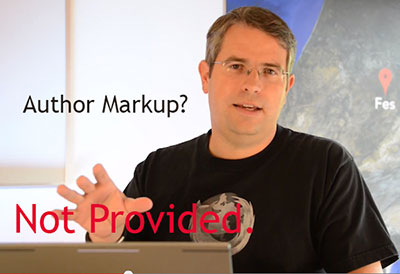Happy Friday everybody! As you know, I do my best to put my ear down to the SEO ground so you don’t miss the important stuff (Doors reference). Let me tell you, it was a very frustrating week for the inbound marketing community; however, I firmly believe that the majority of business owners really have nothing to worry about.
The whole unnecessary fiasco started on Matt Cutts’ blog wherein he initially posted a confusing piece of hyperbole that condemned basically every SEO and online copywriter in the business. In a nutshell, Cutts went in dry on writers and made a blanket statement that we’re all sinister spammers. Cutts later retracted clarified his previous statement, but it was too late. Phoney SEOs and Cutts butt kissers already gobbled up the story, and spewed the new narrative that guest blogging should be considered a four letter word in the online marketing world across every social network.
Now I know that numerous experts have already weighed in on this nonsense, and I’m not adding anything new to the discussion beyond my personal viewpoint. Nevertheless, I felt obligated to relay the story to you before you’re fed false infauxmation by the talking heads.
Who is Matt Cutts to tell me how to run my business blog?
For those of you who are not familiar with the Cutts, he’s known throughout the SEO industry as the Google spam cop. He’s head of the webspam department at Google, and acts as the company’s spokesperson on related issues. Consequently, he’s got a giant target on his back. Loathed by spammers around the globe, Cutts performs the essentially thankless job of keeping the dark underbelly of the internet hidden from your view. In that sense, I have to respect the guy. Spam sucks, and I certainly don’t want it to pollute my search experience or yours.
 And that’s where my warm fuzzy feelings for Cutts abruptly end. I’ve shared my beef with his actions before, and I generally dislike his entire approach. He’s got a habit of making sweeping generalizations that serve no purpose other than to raise our collective blood pressure. The latest incident serves as the perfect example of what I’m referring to here. He drops a huge bomb filled with unjust nastiness seemingly for the sole purpose of making people like us go gray early.
And that’s where my warm fuzzy feelings for Cutts abruptly end. I’ve shared my beef with his actions before, and I generally dislike his entire approach. He’s got a habit of making sweeping generalizations that serve no purpose other than to raise our collective blood pressure. The latest incident serves as the perfect example of what I’m referring to here. He drops a huge bomb filled with unjust nastiness seemingly for the sole purpose of making people like us go gray early.
The original article felt like a slap in the face to my work along with the awesome guest authors we’ve had the pleasure of featuring on this site. Some of the best, most popular articles on our blog came from other people. I was fuming, and ran downstairs to explain the situation to our manager. I told him I didn’t care what Cutts said; I would continue to allow contributors and post on a couple of other sites myself. He agreed. I suggest you do the same no matter what Cutts says because ultimately, he could care less about your long term success.
Guest posting tips Q & A: How to keep your white hat on
The term “white hat” is more or less synonymous with good, above the board, squeaky clean, etc., SEO as opposed to black hat, meaning scandalous SEO tactics from the depths of hell. In fact, black hat wearers are responsible for this whole shebang in the sense that they co-opted another kosher way to increase your brand’s visibility. Guest blogging used to be the darling of the white hats, hence why so many of us are up in arms. I presume you still have lots of questions about how you can go about guest blogging for your business website without incurring any penalties. I can’t make any guarantees (no real SEO would), but here are my suggestions for your consideration.
1) Do I need to nofollow every link in a guest post?
Cutts Answer: Absolutely.
My Answer: Please don’t insult hard working writers with a no follow in the bio. As a Copyblogger commenter noted, most people outside of the SEO world don’t even know what no follow means.
Just so you’re aware, there are two kinds of links on the web. Followed links are the kind you want because they pass juice along to your site. No follow links have little to no value, hence the name. They are clickable, which means you might get traffic from them, but they don’t feed your site the juice it needs to improve your organic positioning. So by telling you to no follow every single link in a guest post, Google’s turning you into the cliché client who refuses to pay you, but promises “exposure” as compensation.
If you really want to be on the extra safe side, do their bidding. As a writer/creative professional, I can’t in good conscience ask others to give me a piece of themselves for nothing.
2) How can I tell whether or not an author is legit?
Cutts Answer: First ask for a DNA sample for the authority scrutiny lab. Then tell them you expect nothing short of exceptional content for nothing in return. If they agree, post away.
My Answer: There are plenty of ways to avoid being burned by spammers. Did an author you’ve never heard of send you a cold email full of spelling mistakes? That should raise a red flag immediately. You’re way better off collaborating with people who are already a part of your extended network.
Should you encounter an unknown author you get a good feeling about, ask for samples, check for authorship + rich snippets of his or her domain (legit writers WANT to own their online presence) , research the sites they already write for, and audit their social media accounts. Create content guidelines all contributors must agree to prior to posting, and enforce them without hesitation. Don’t be afraid to exercise your editorial powers.
3) Where do I find safe sites to post on?
Cutts Answer: No site will escape my wrath.
My Answer: Use common sense. Start with established sites in your industry, major publishers, and friends from your network. As long as you stick with reputable spots where you add value for readers, you shouldn’t stress. I hope it goes without saying that hiring 3rd party guest posting services is out of the question.
4) Should I Ask Webmasters to Remove my Old Guest Articles?
Cutts Answer: It’s too late to save yourself.
My Answer: Only if you posted on questionable sites in the past. Otherwise, that’s not necessary in my book. If you’ve always been above the board, why bother backtracking?
5) What are the right reasons for contributing to other websites?
Cutts Answer: There aren’t any. Next question.
My Answer: Cutts claims that guest blogging strictly for SEO purposes is dead. To paraphrase Jennita from Moz, thanks, captain obvious! I loved Jennita’s sentiment because it echos my own feeling that Cutts freaked out for no reason. Spammers care about links alone, and that’s partly Google’s fault. By perpetuating PageRank, they’re indirectly encouraging the behavior Cutts supposedly abhors.
Everyone has his or her own reasons for wanting to post on other sites. Personally, I enjoy contributing because it helps me reach new audiences, and gives me an opportunity to write about topics that I wouldn’t normally cover on this blog. To me articles are a fun way to build my reputation, which is important for my fairly young career.
Of course I appreciate earning a link; I’d be lying if I said otherwise. That’s right I said earned. Writing is hard work, and I do it well. This post took a few hours to produce, and that time is money. I might be willing to accept a no follow as a favor or for an amazing opportunity. But I don’t think asking for a single link with brand name anchor text is too much to ask for my labor.
6) Will Google Crack Down on Shady Spammy Spinners?
Cutts Answer: Bloggers beware.
My Answer: They already have! Remember Penguin 2.0? That algorithm update targeted domains with low quality backlinks. In other words, Google takes measures to combat the crap every day. Spam is spam regardless of the form is assumes.
Let’s Talk
Do you have questions about your blogging best practices? Want to tell me I’m completely off base? Whatever you want to say, please speak your mind in the comments below!
